Ruofei Bai
Michael
TIDAL: Temporally Interleaved Diffusion and Action Loop for High-Frequency VLA Control
Jan 21, 2026Abstract:Large-scale Vision-Language-Action (VLA) models offer semantic generalization but suffer from high inference latency, limiting them to low-frequency batch-and-execute paradigm. This frequency mismatch creates an execution blind spot, causing failures in dynamic environments where targets move during the open-loop execution window. We propose TIDAL (Temporally Interleaved Diffusion and Action Loop), a hierarchical framework that decouples semantic reasoning from high-frequency actuation. TIDAL operates as a backbone-agnostic module for diffusion-based VLAs, using a dual-frequency architecture to redistribute the computational budget. Specifically, a low-frequency macro-intent loop caches semantic embeddings, while a high-frequency micro-control loop interleaves single-step flow integration with execution. This design enables approximately 9 Hz control updates on edge hardware (vs. approximately 2.4 Hz baselines) without increasing marginal overhead. To handle the resulting latency shift, we introduce a temporally misaligned training strategy where the policy learns predictive compensation using stale semantic intent alongside real-time proprioception. Additionally, we address the insensitivity of static vision encoders to velocity by incorporating a differential motion predictor. TIDAL is architectural, making it orthogonal to system-level optimizations. Experiments show a 2x performance gain over open-loop baselines in dynamic interception tasks. Despite a marginal regression in static success rates, our approach yields a 4x increase in feedback frequency and extends the effective horizon of semantic embeddings beyond the native action chunk size. Under non-paused inference protocols, TIDAL remains robust where standard baselines fail due to latency.
FinMMDocR: Benchmarking Financial Multimodal Reasoning with Scenario Awareness, Document Understanding, and Multi-Step Computation
Dec 31, 2025Abstract:We introduce FinMMDocR, a novel bilingual multimodal benchmark for evaluating multimodal large language models (MLLMs) on real-world financial numerical reasoning. Compared to existing benchmarks, our work delivers three major advancements. (1) Scenario Awareness: 57.9% of 1,200 expert-annotated problems incorporate 12 types of implicit financial scenarios (e.g., Portfolio Management), challenging models to perform expert-level reasoning based on assumptions; (2) Document Understanding: 837 Chinese/English documents spanning 9 types (e.g., Company Research) average 50.8 pages with rich visual elements, significantly surpassing existing benchmarks in both breadth and depth of financial documents; (3) Multi-Step Computation: Problems demand 11-step reasoning on average (5.3 extraction + 5.7 calculation steps), with 65.0% requiring cross-page evidence (2.4 pages average). The best-performing MLLM achieves only 58.0% accuracy, and different retrieval-augmented generation (RAG) methods show significant performance variations on this task. We expect FinMMDocR to drive improvements in MLLMs and reasoning-enhanced methods on complex multimodal reasoning tasks in real-world scenarios.
Following Is All You Need: Robot Crowd Navigation Using People As Planners
Apr 15, 2025Abstract:Navigating in crowded environments requires the robot to be equipped with high-level reasoning and planning techniques. Existing works focus on developing complex and heavyweight planners while ignoring the role of human intelligence. Since humans are highly capable agents who are also widely available in a crowd navigation setting, we propose an alternative scheme where the robot utilises people as planners to benefit from their effective planning decisions and social behaviours. Through a set of rule-based evaluations, we identify suitable human leaders who exhibit the potential to guide the robot towards its goal. Using a simple base planner, the robot follows the selected leader through shorthorizon subgoals that are designed to be straightforward to achieve. We demonstrate through both simulated and real-world experiments that our novel framework generates safe and efficient robot plans compared to existing planners, even without predictive or data-driven modules. Our method also brings human-like robot behaviours without explicitly defining traffic rules and social norms. Code will be available at https://github.com/centiLinda/PeopleAsPlanner.git.
AirSwarm: Enabling Cost-Effective Multi-UAV Research with COTS drones
Mar 10, 2025Abstract:Traditional unmanned aerial vehicle (UAV) swarm missions rely heavily on expensive custom-made drones with onboard perception or external positioning systems, limiting their widespread adoption in research and education. To address this issue, we propose AirSwarm. AirSwarm democratizes multi-drone coordination using low-cost commercially available drones such as Tello or Anafi, enabling affordable swarm aerial robotics research and education. Key innovations include a hierarchical control architecture for reliable multi-UAV coordination, an infrastructure-free visual SLAM system for precise localization without external motion capture, and a ROS-based software framework for simplified swarm development. Experiments demonstrate cm-level tracking accuracy, low-latency control, communication failure resistance, formation flight, and trajectory tracking. By reducing financial and technical barriers, AirSwarm makes multi-robot education and research more accessible. The complete instructions and open source code will be available at
Realm: Real-Time Line-of-Sight Maintenance in Multi-Robot Navigation with Unknown Obstacles
Feb 21, 2025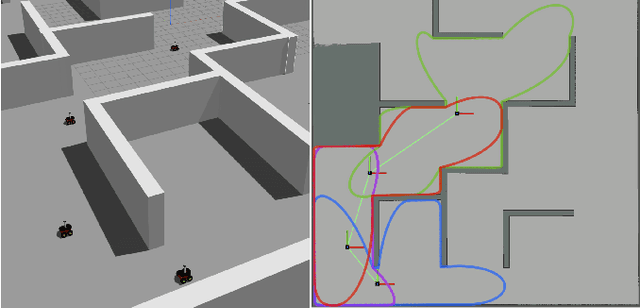
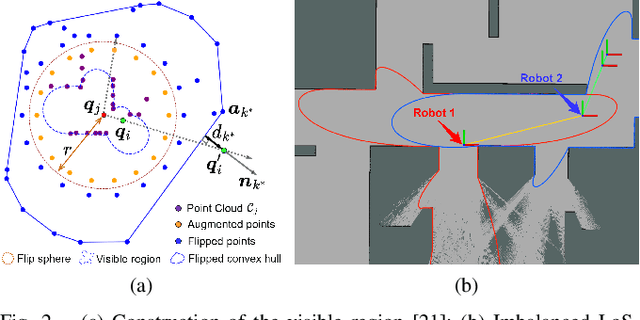
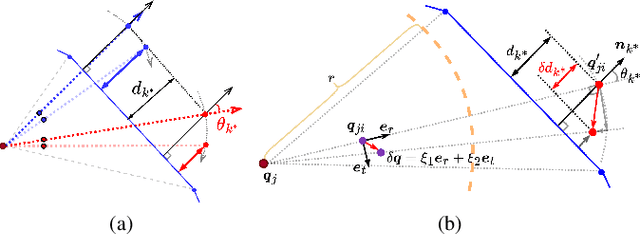
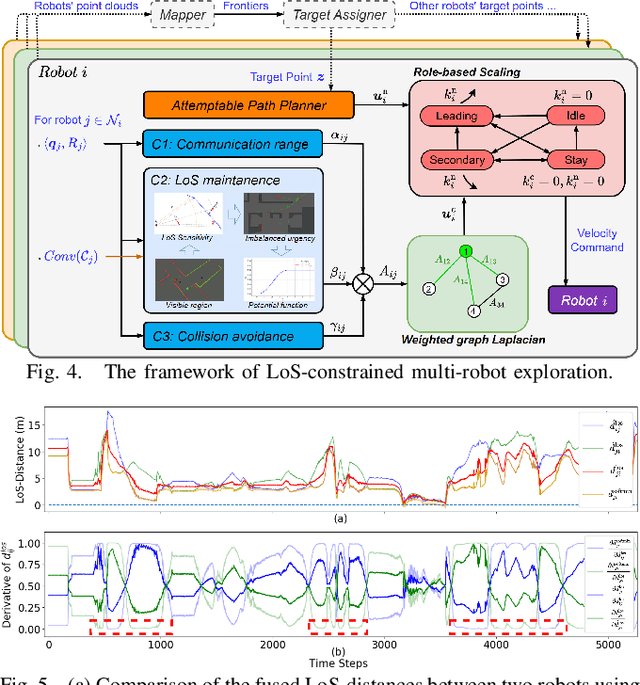
Abstract:Multi-robot navigation in complex environments relies on inter-robot communication and mutual observations for coordination and situational awareness. This paper studies the multi-robot navigation problem in unknown environments with line-of-sight (LoS) connectivity constraints. While previous works are limited to known environment models to derive the LoS constraints, this paper eliminates such requirements by directly formulating the LoS constraints between robots from their real-time point cloud measurements, leveraging point cloud visibility analysis techniques. We propose a novel LoS-distance metric to quantify both the urgency and sensitivity of losing LoS between robots considering potential robot movements. Moreover, to address the imbalanced urgency of losing LoS between two robots, we design a fusion function to capture the overall urgency while generating gradients that facilitate robots' collaborative movement to maintain LoS. The LoS constraints are encoded into a potential function that preserves the positivity of the Fiedler eigenvalue of the robots' network graph to ensure connectivity. Finally, we establish a LoS-constrained exploration framework that integrates the proposed connectivity controller. We showcase its applications in multi-robot exploration in complex unknown environments, where robots can always maintain the LoS connectivity through distributed sensing and communication, while collaboratively mapping the unknown environment. The implementations are open-sourced at https://github.com/bairuofei/LoS_constrained_navigation.
Swept Volume-Aware Trajectory Planning and MPC Tracking for Multi-Axle Swerve-Drive AMRs
Dec 22, 2024



Abstract:Multi-axle autonomous mobile robots (AMRs) are set to revolutionize the future of robotics in logistics. As the backbone of next-generation solutions, these robots face a critical challenge: managing and minimizing the swept volume during turns while maintaining precise control. Traditional systems designed for standard vehicles often struggle with the complex dynamics of multi-axle configurations, leading to inefficiency and increased safety risk in confined spaces. Our innovative framework overcomes these limitations by combining swept volume minimization with Signed Distance Field (SDF) path planning and model predictive control (MPC) for independent wheel steering. This approach not only plans paths with an awareness of the swept volume but actively minimizes it in real-time, allowing each axle to follow a precise trajectory while significantly reducing the space the vehicle occupies. By predicting future states and adjusting the turning radius of each wheel, our method enhances both maneuverability and safety, even in the most constrained environments. Unlike previous works, our solution goes beyond basic path calculation and tracking, offering real-time path optimization with minimal swept volume and efficient individual axle control. To our knowledge, this is the first comprehensive approach to tackle these challenges, delivering life-saving improvements in control, efficiency, and safety for multi-axle AMRs. Furthermore, we will open-source our work to foster collaboration and enable others to advance safer, more efficient autonomous systems.
Collaborative Graph Exploration with Reduced Pose-SLAM Uncertainty via Submodular Optimization
Jul 01, 2024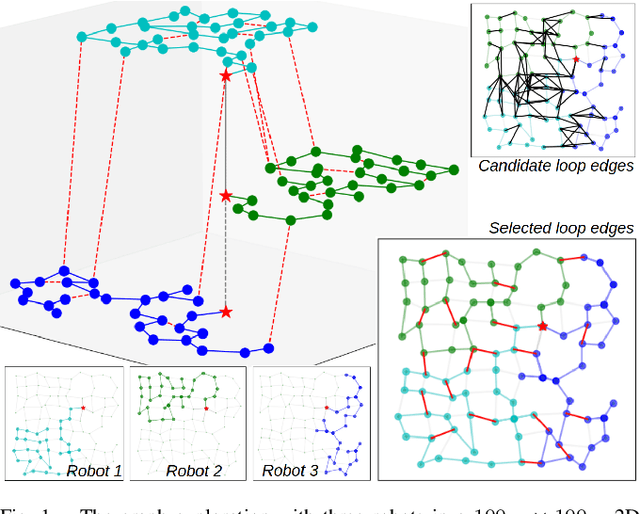
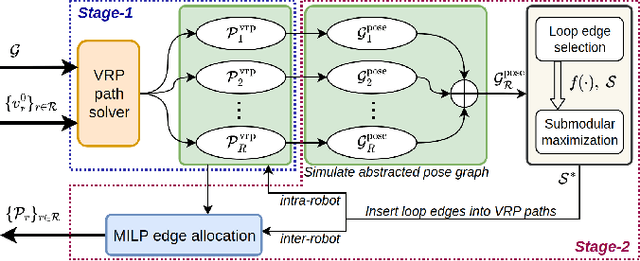
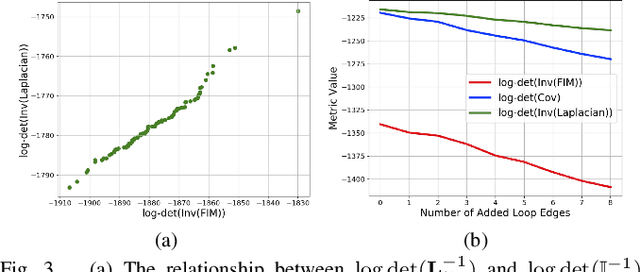
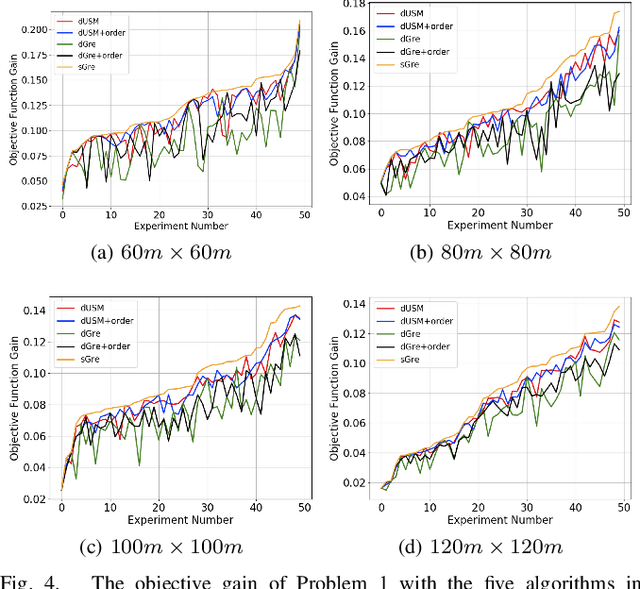
Abstract:This paper considers the collaborative graph exploration problem in GPS-denied environments, where a group of robots are required to cover a graph environment while maintaining reliable pose estimations in collaborative simultaneous localization and mapping (SLAM). Considering both objectives presents challenges for multi-robot pathfinding, as it involves the expensive covariance inference for SLAM uncertainty evaluation, especially considering various combinations of robots' paths. To reduce the computational complexity, we propose an efficient two-stage strategy where exploration paths are first generated for quick coverage, and then enhanced by adding informative and distance-efficient loop-closing actions, called loop edges, along the paths for reliable pose estimation. We formulate the latter problem as a non-monotone submodular maximization problem by relating SLAM uncertainty with pose graph topology, which (1) facilitates more efficient evaluation of SLAM uncertainty than covariance inference, and (2) allows the application of approximation algorithms in submodular optimization to provide optimality guarantees. We further introduce the ordering heuristics to improve objective values while preserving the optimality bound. Simulation experiments over randomly generated graph environments verify the efficiency of our methods in finding paths for quick coverage and enhanced pose graph reliability, and benchmark the performance of the approximation algorithms and the greedy-based algorithm in the loop edge selection problem. Our implementations will be open-source at https://github.com/bairuofei/CGE.
Graph-based SLAM-Aware Exploration with Prior Topo-Metric Information
Aug 31, 2023Abstract:Autonomous exploration requires the robot to explore an unknown environment while constructing an accurate map with the SLAM (Simultaneous Localization and Mapping) techniques. Without prior information, the exploratory performance is usually conservative due to the limited planning horizon. This paper exploits a prior topo-metric graph of the environment to benefit both the exploration efficiency and the pose graph accuracy in SLAM. Based on recent advancements in relating pose graph reliability with graph topology, we are able to formulate both objectives into a SLAM-aware path planning problem over the prior graph, which finds a fast exploration path with informative loop closures that globally stabilize the pose graph. Furthermore, we derive theoretical thresholds to speed up the greedy algorithm to the problem, which significantly prune non-optimal loop closures in iterations. The proposed planner is incorporated into a hierarchical exploration framework, with flexible features including path replanning and online prior map update that adds additional information to the prior graph. Extensive experiments indicate that our method has comparable exploration efficiency to others while consistently maintaining higher mapping accuracy in various environments. Our implementations will be open-source on GitHub.
Hierarchical Multi-robot Strategies Synthesis and Optimization under Individual and Collaborative Temporal Logic Specifications
Oct 21, 2021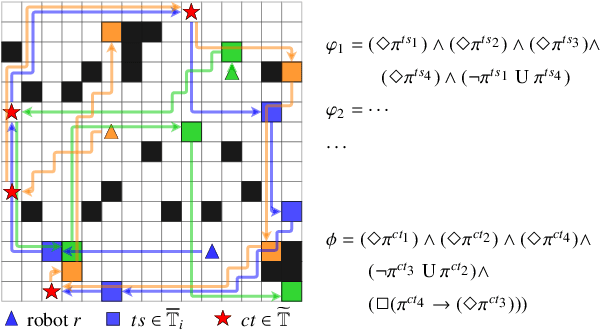
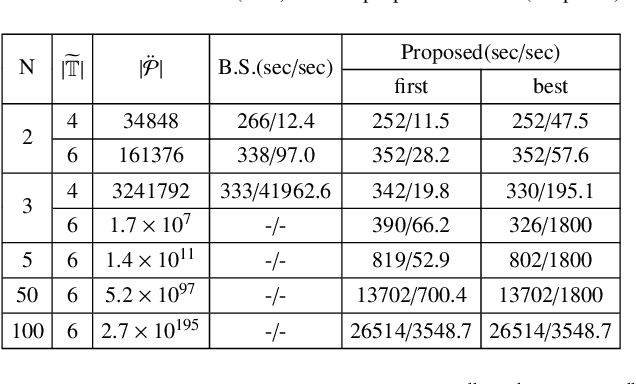
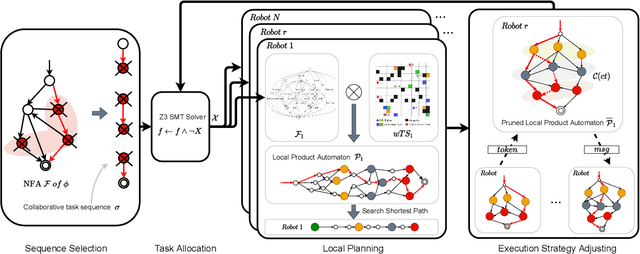

Abstract:This paper presents a hierarchical framework to solve the multi-robot temporal task planning problem. We assume that each robot has its individual task specification and the robots have to jointly satisfy a global collaborative task specification, both described in linear temporal logic. Specifically, a central server firstly extracts and decomposes a collaborative task sequence from the automaton corresponding to the collaborative task specification, and allocates the subtasks in the sequence to robots. The robots can then synthesize their initial execution strategies based on locally constructed product automatons, combining the assigned collaborative tasks and their individual task specifications. Furthermore, we propose a distributed execution strategy adjusting mechanism to iteratively improve the time efficiency, by reducing wait time in collaborations caused by potential synchronization constraints. We prove the completeness of the proposed framework under assumptions, and analyze its time complexity and optimality. Extensive simulation results verify the scalability and optimization efficiency of the proposed method.
Multi-Robot Task Planning under Individual and Collaborative Temporal Logic Specifications
Aug 27, 2021



Abstract:This paper investigates the task coordination of multi-robot where each robot has a private individual temporal logic task specification; and also has to jointly satisfy a globally given collaborative temporal logic task specification. To efficiently generate feasible and optimized task execution plans for the robots, we propose a hierarchical multi-robot temporal task planning framework, in which a central server allocates the collaborative tasks to the robots, and then individual robots can independently synthesize their task execution plans in a decentralized manner. Furthermore, we propose an execution plan adjusting mechanism that allows the robots to iteratively modify their execution plans via privacy-preserved inter-agent communication, to improve the expected actual execution performance by reducing waiting time in collaborations for the robots. The correctness and efficiency of the proposed method are analyzed and also verified by extensive simulation experiments.
 Add to Chrome
Add to Chrome Add to Firefox
Add to Firefox Add to Edge
Add to Edge